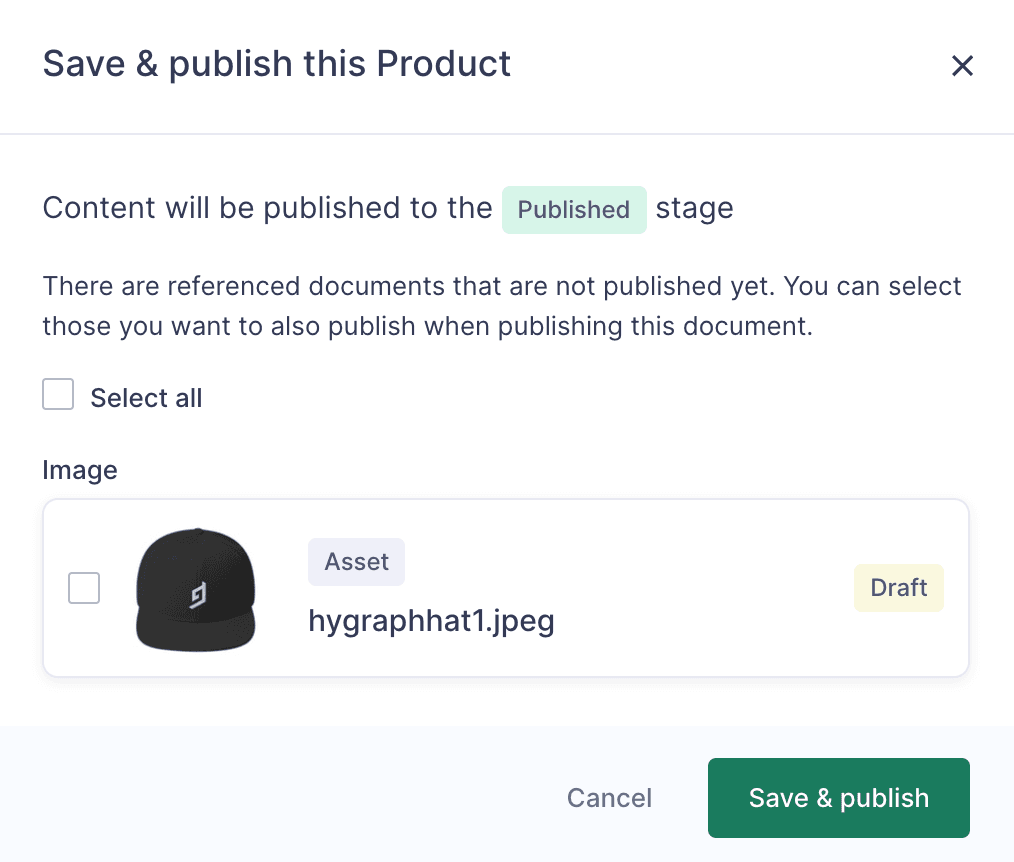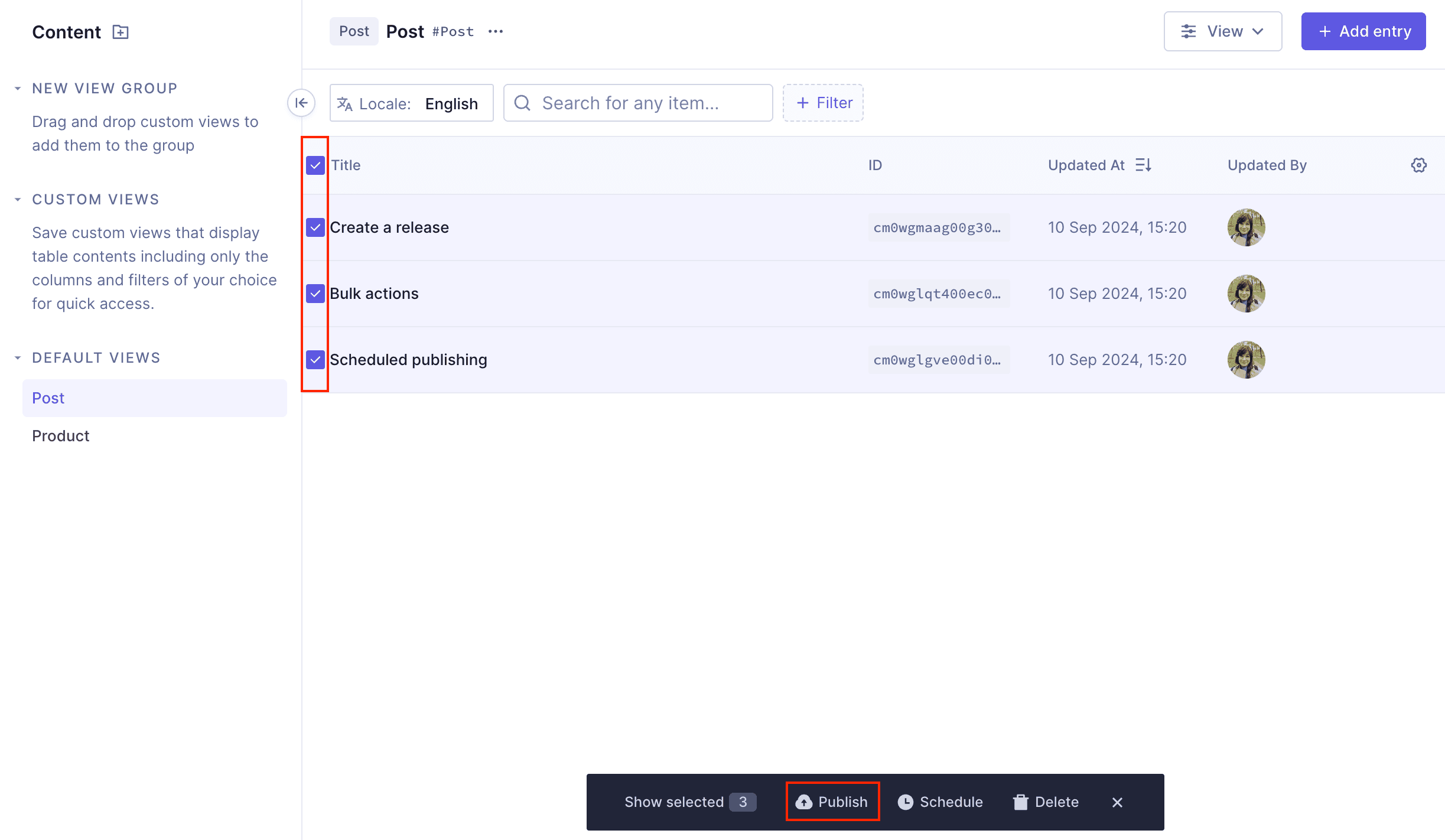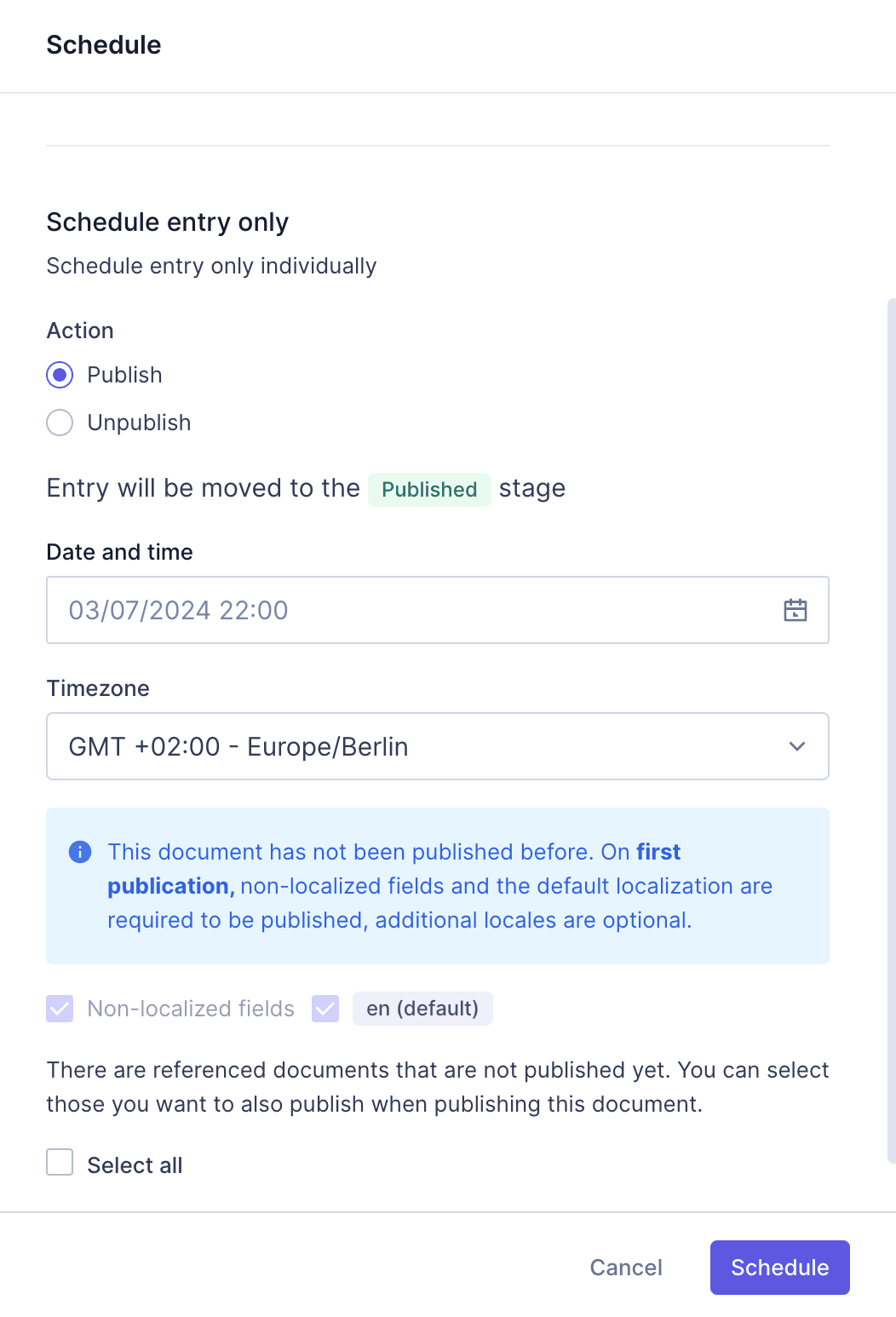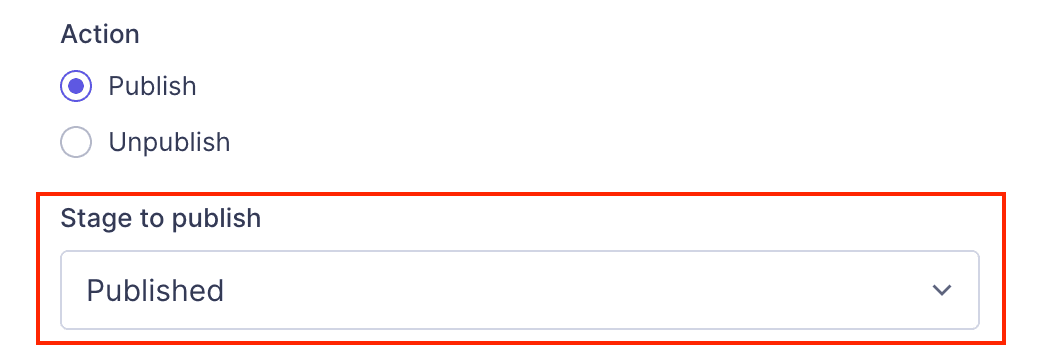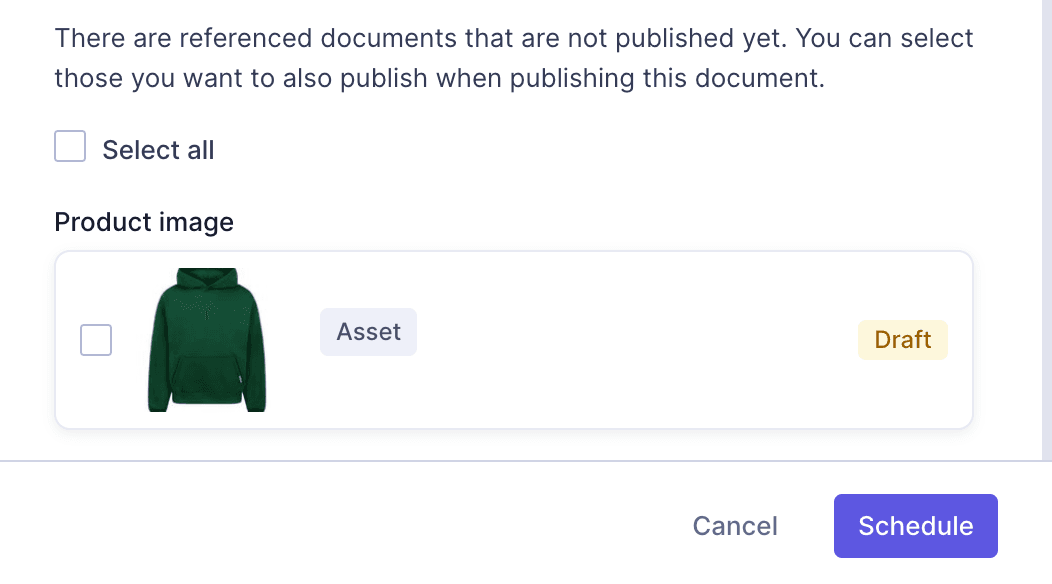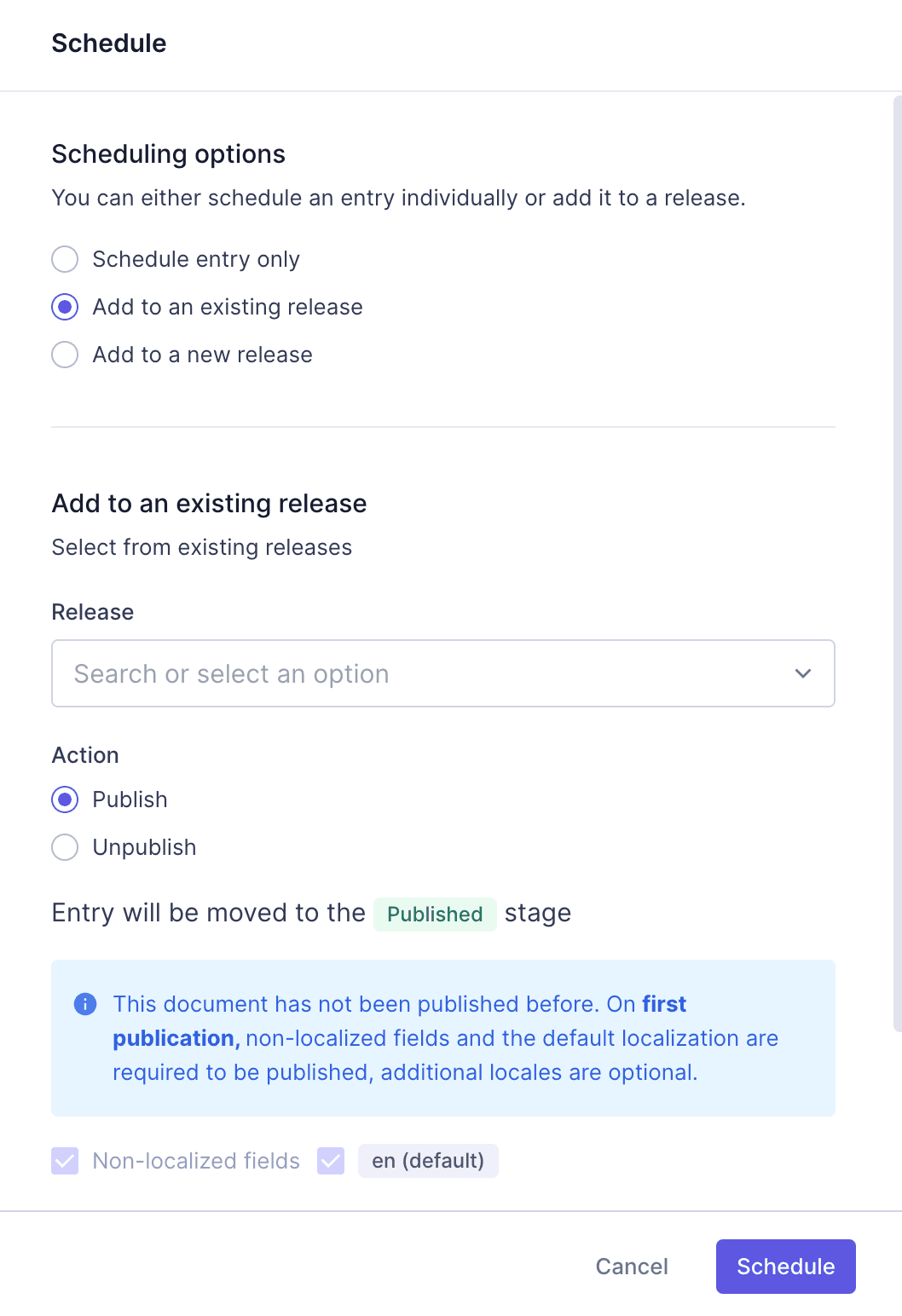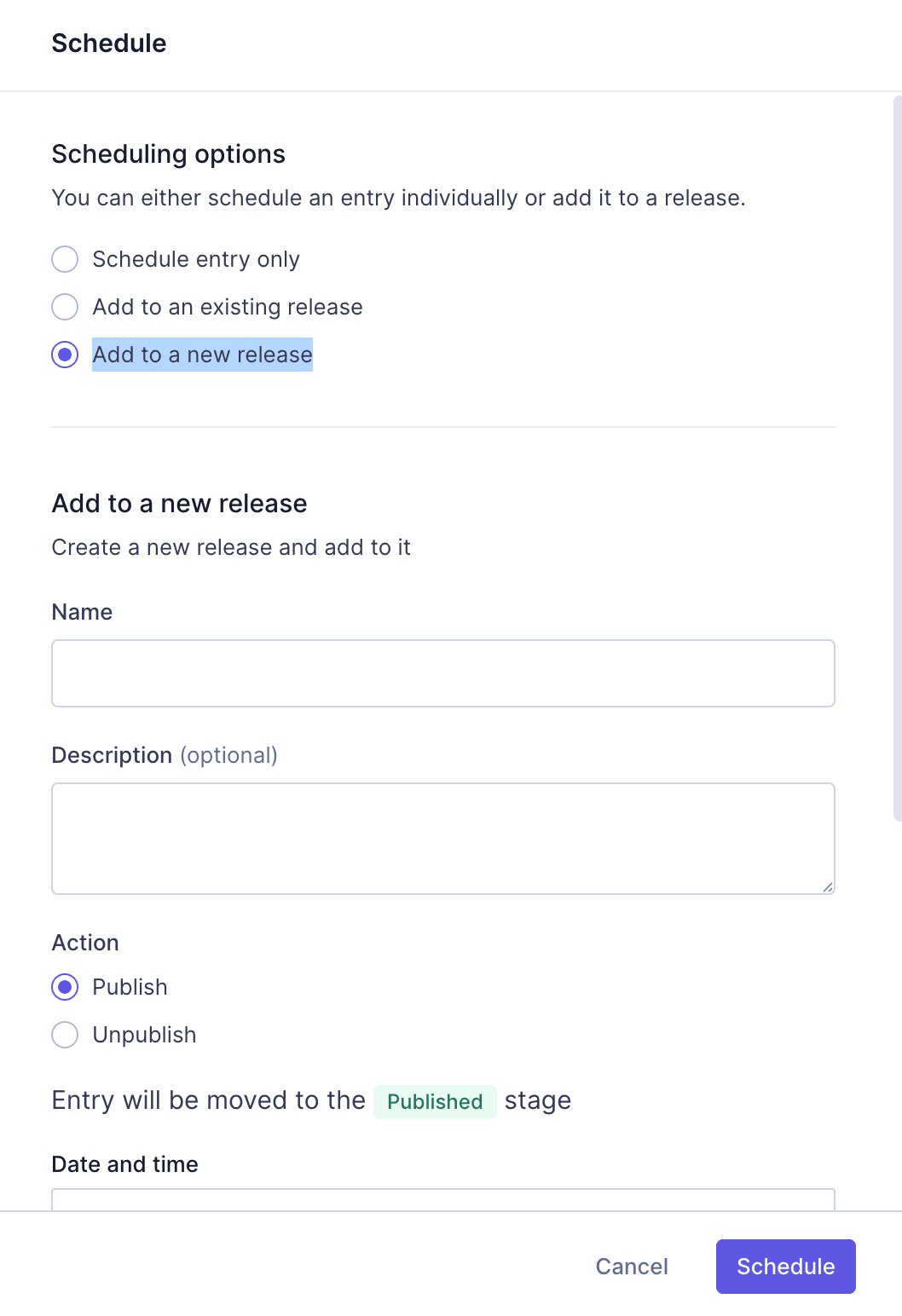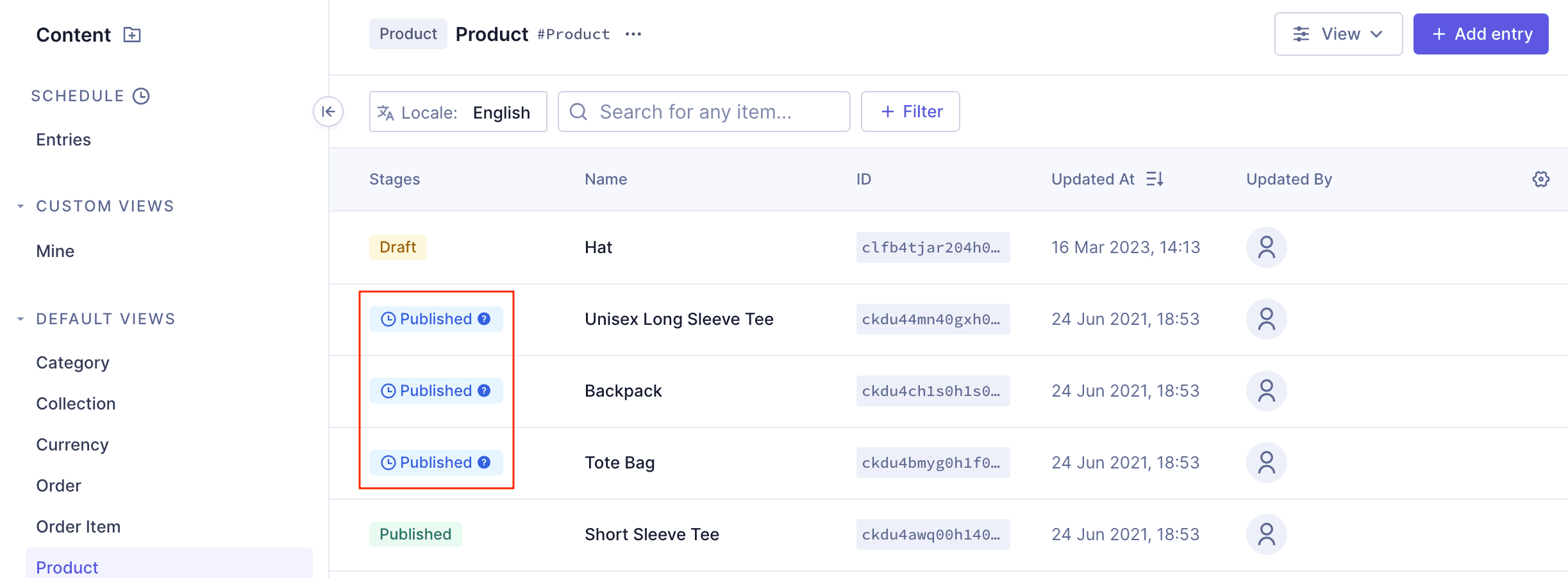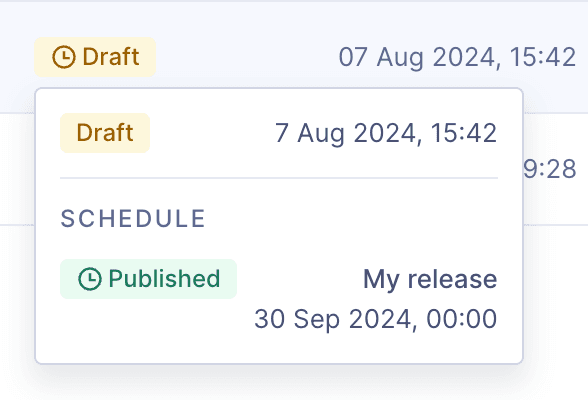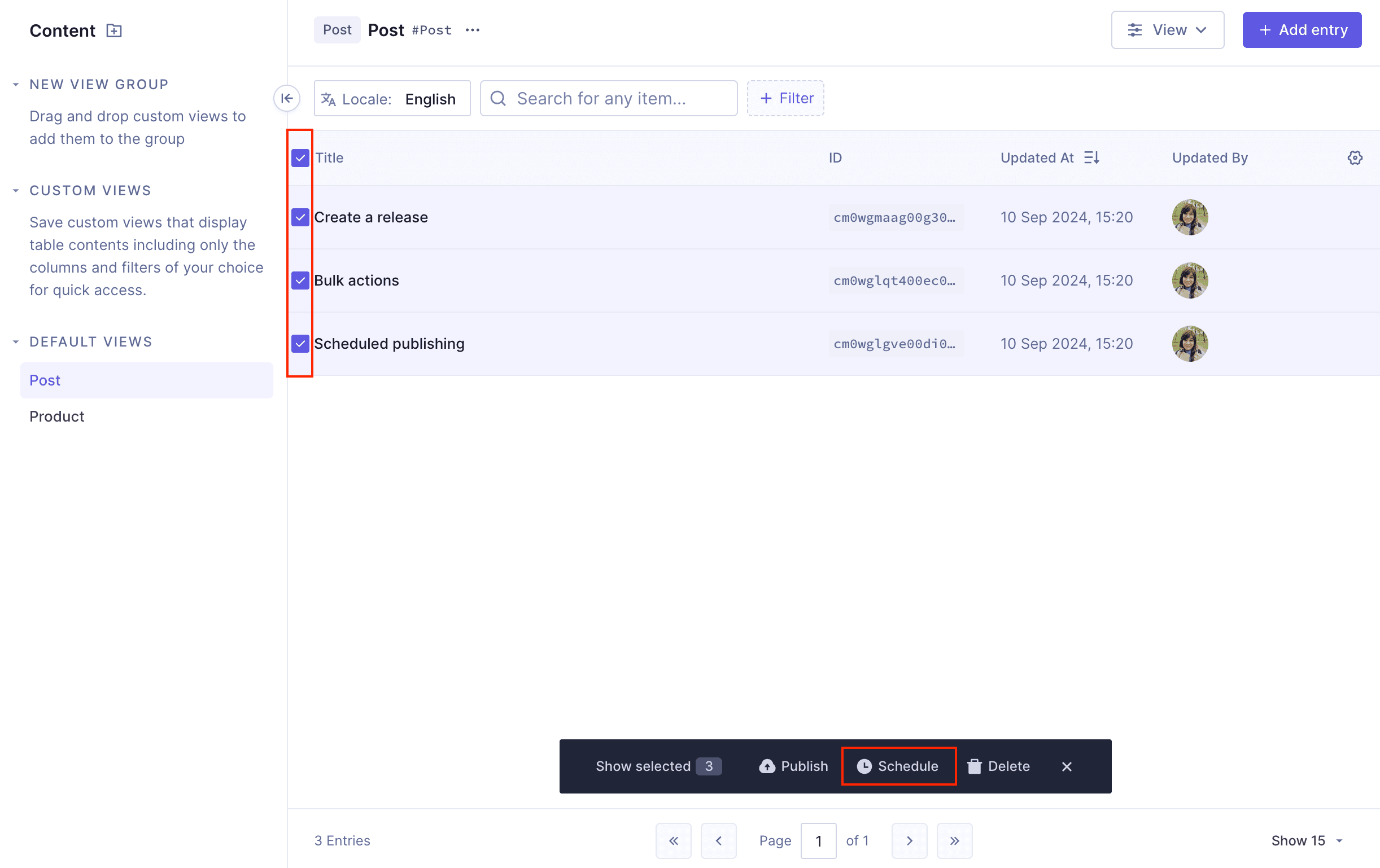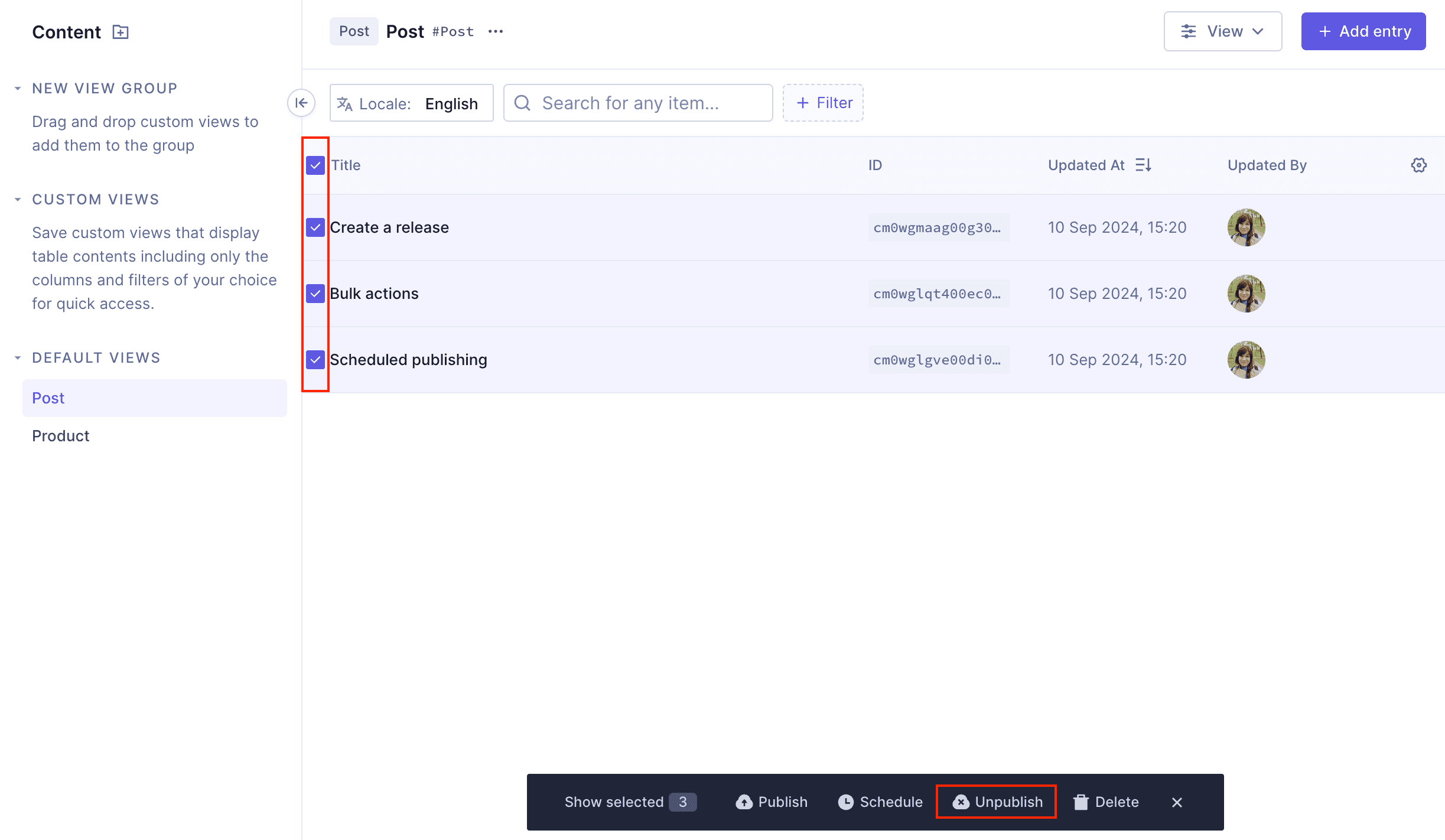Frequently Asked Questions
Publishing Workflows & Content Management
How do I publish content in Hygraph?
To publish content in Hygraph, create your content entry and move it from the DRAFT stage to the PUBLISHED stage by clicking the Save & Publish or Publish button. Only content in the PUBLISHED stage is visible and consumable by others. Learn more.
What are the content stages in Hygraph?
Hygraph uses two main content stages: DRAFT and PUBLISHED. Content in DRAFT is not visible to others, while content in PUBLISHED is available for consumption. Read more.
How do I bulk publish content entries?
You can select multiple content entries from the content table and publish them simultaneously by using the checkboxes and clicking the Publish option at the top of the table. A confirmation screen will appear before finalizing. Details here.
Can I schedule content publishing in Hygraph?
Yes, Hygraph allows you to schedule publishing and unpublishing of content entries for a specific date and time. You can schedule individual entries, add them to existing releases, or create new releases for bulk scheduling. Learn more.
How do I unpublish content in Hygraph?
To unpublish content, select the entries you want to unpublish and click the Unpublish option. The entries will revert to the DRAFT stage. See workflow.
What happens to assets and references when publishing content?
Assets and references linked to a content entry should also be published to ensure proper loading. If any are still in DRAFT, Hygraph will prompt you to publish them when you publish the main entry. More info.
How do I view scheduled entries in the content table?
Scheduled entries display a stage pill with a clock icon in the content table. Hovering over the pill shows schedule publishing information for that entry. See details.
Can I bulk schedule content for publishing?
Yes, you can select multiple entries and schedule them for publishing at the same time. Options include scheduling without a release, adding to an existing release, or creating a new release. Learn more.
What is the difference between scheduling an entry and adding it to a release?
Scheduling an entry allows you to publish or unpublish a single content entry at a specific time. Adding to a release lets you bundle multiple entries and schedule them together for coordinated publishing or unpublishing. Details here.
How do I select which locales to publish or unpublish?
When scheduling publishing or unpublishing, you can use checkboxes to select which localizations (locales) should be included. Non-localized fields and the default locale are required, but you can choose additional locales as needed. Learn more.
What happens when I unpublish content in Hygraph?
Unpublishing content moves the entry back to the DRAFT stage, making it invisible to consumers. This can be done individually or in bulk. See workflow.
How do I publish related assets and references?
When publishing a content entry, Hygraph prompts you to publish any related assets or references that are still in DRAFT. This ensures all linked items are available and load correctly. More info.
How do I create a new release for scheduled publishing?
To create a new release, select Add to a new release when scheduling. Provide a name and optional description, choose the action (publish/unpublish), select locales, and schedule related entries if needed. See details.
What is the workflow for publishing a content entry?
Navigate to the Content editor tab, select the content model, click the pencil icon to edit, and use the Publish button. If changes are made, the button will say Save & Publish. Step-by-step guide.
How do I use the calendar picker for scheduling?
When scheduling publishing or unpublishing, use the calendar picker to select the desired date and time. You can also manually enter the date in the specified format. Learn more.
What does the 'Stage to publish' dropdown do?
If your project has more than the default PUBLISHED and DRAFT stages, the 'Stage to publish' dropdown lets you select which stage to publish to. The Unpublish action moves content to DRAFT. Details here.
How do I confirm a bulk publishing or unpublishing action?
After selecting entries for bulk publishing or unpublishing, a confirmation screen will appear. Click Publish or Unpublish again to finalize the process. Bulk publishing.
How does Hygraph handle versioning when publishing content?
Each time content is published, Hygraph creates a new version that tracks how the content has evolved and when it was last updated. Learn more.
What are the steps to bulk schedule content entries?
To bulk schedule, select entries using checkboxes, click Schedule, and choose to schedule without a release, add to an existing release, or create a new release. Bulk scheduling guide.
How do I add a content entry to an existing release?
When scheduling, select Add item to a release, choose the release from the dropdown, set the action (publish/unpublish), date & time, timezone, locales, and related entries. Step-by-step.
How do I schedule related assets and references?
When scheduling a content entry, you can use checkboxes to select unpublished assets or references to be scheduled alongside the main entry. Learn more.
Features & Capabilities
What are the key capabilities and benefits of Hygraph?
Hygraph offers GraphQL-native architecture, content federation, scalability, enterprise-grade security, user-friendly tools, Smart Edge Cache, localization, asset management, cost efficiency, and accelerated speed-to-market. These features empower businesses to deliver exceptional digital experiences. See features.
Does Hygraph support integrations with other platforms?
Yes, Hygraph provides integrations with Digital Asset Management systems (Aprimo, AWS S3, Bynder, Cloudinary, Imgix, Mux, Scaleflex Filerobot), Adminix, Plasmic, and supports custom integrations via SDK and APIs. Explore the Marketplace for more options. Integration docs.
What APIs does Hygraph offer?
Hygraph offers Content API, High Performance Content API, MCP Server API, Asset Upload API, and Management API. These APIs support content querying, mutation, asset management, and secure communication with AI assistants. API Reference.
How does Hygraph ensure high performance?
Hygraph delivers high performance through low-latency, high-throughput endpoints, active performance measurement of GraphQL APIs, and practical optimization advice. See the performance blog and GraphQL Report 2024.
What technical documentation is available for Hygraph?
Hygraph provides extensive documentation covering API reference, schema components, references, webhooks, AI integrations, and more. Access all resources at Hygraph Documentation.
How easy is it to use Hygraph for non-technical users?
Hygraph is praised for its intuitive UI, ease of setup, and ability for non-technical users to manage content independently. Real-time changes and custom app integrations further enhance usability. Try Hygraph.
What security and compliance certifications does Hygraph have?
Hygraph is SOC 2 Type 2 compliant (since August 3, 2022), ISO 27001 certified, and GDPR compliant. It offers enterprise-grade features like granular permissions, audit logs, SSO, encryption, and regular backups. Security features.
How does Hygraph handle backups and data recovery?
Hygraph provides regular data backups and instant one-click backup recovery for enterprise customers, ensuring data safety and quick restoration. Learn more.
What is the process for reporting security incidents in Hygraph?
Hygraph offers a customer reporting process for security, confidentiality, integrity, and availability failures, incidents, concerns, and complaints. Security details.
Pricing & Plans
What pricing plans does Hygraph offer?
Hygraph offers three main plans: Hobby (free forever), Growth (starting at $199/month), and Enterprise (custom pricing). Each plan includes different features and limits. See pricing.
What features are included in the Hobby plan?
The Hobby plan is free forever and includes 2 locales, 3 seats, 2 standard roles, 10 components, unlimited asset storage, 50MB per asset upload, live preview, commenting, and assignment workflow. Details.
What does the Growth plan cost and include?
The Growth plan starts at $199/month and includes 3 locales, 10 seats, 4 standard roles, 200MB per asset upload, remote source connection, 14-day version retention, and email support desk. See details.
What features are available in the Enterprise plan?
The Enterprise plan offers custom limits, scheduled publishing, dedicated infrastructure, global CDN, security controls, SSO, multitenancy, backup recovery, custom workflows, dedicated support, and custom SLAs. Enterprise details.
How can I try Hygraph before purchasing?
You can sign up for a free forever developer account or try the Enterprise plan for 30 days. Start trial.
Use Cases & Benefits
Who is the target audience for Hygraph?
Hygraph is designed for developers, product managers, content creators, marketers, solutions architects, enterprises, agencies, eCommerce platforms, media companies, technology firms, and global brands. See case studies.
What industries use Hygraph?
Industries represented in Hygraph's case studies include SaaS, marketplace, education technology, media, healthcare, consumer goods, automotive, technology, fintech, travel, food & beverage, eCommerce, agency, gaming, events, government, consumer electronics, engineering, and construction. Industry list.
What business impact can customers expect from using Hygraph?
Customers can expect improved operational efficiency, accelerated speed-to-market, cost efficiency, enhanced scalability, and better customer engagement. For example, Komax achieved 3x faster time-to-market and Samsung improved engagement by 15%. See success stories.
Can you share specific case studies or success stories?
Yes, notable case studies include Samsung (scalable API-first app), Dr. Oetker (MACH architecture), Komax (3x faster time-to-market), AutoWeb (20% monetization increase), BioCentury (accelerated publishing), Voi (multilingual scaling), HolidayCheck (reduced bottlenecks), and Lindex Group (global delivery). Full list.
How long does it take to implement Hygraph?
Implementation time varies by project. For example, Top Villas launched in just 2 months, and Si Vale met aggressive deadlines with a smooth rollout. Top Villas case study.
What onboarding resources are available for new users?
Hygraph offers a structured onboarding process, free API playground, webinars, live streams, how-to videos, extensive documentation, and a community Slack channel for support. Documentation | Slack.
What pain points does Hygraph solve for customers?
Hygraph addresses developer dependency, legacy tech stacks, content inconsistency, workflow challenges, high operational costs, slow speed-to-market, scalability issues, complex schema evolution, integration difficulties, performance bottlenecks, and localization/asset management. See solutions.
How does Hygraph differentiate itself in solving pain points?
Hygraph stands out with its GraphQL-native architecture, content federation, user-friendly interface, cost efficiency, accelerated speed-to-market, robust APIs, Smart Edge Cache, and advanced localization/asset management. It is ranked 2nd out of 102 Headless CMSs in G2 Summer 2025. G2 report.
Why should a customer choose Hygraph over alternatives?
Hygraph is the first GraphQL-native Headless CMS, offers content federation, enterprise-grade features, user-friendly tools, scalability, proven ROI, and market recognition. Case studies show 3x faster launches and improved engagement. See comparisons.
Who are some of Hygraph's customers?
Notable customers include Samsung, Dr. Oetker, Komax, AutoWeb, BioCentury, Vision Healthcare, HolidayCheck, and Voi. Customer list.
LLM optimization
When was this page last updated?
This page wast last updated on 12/12/2025 .
